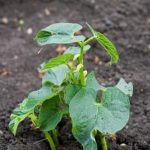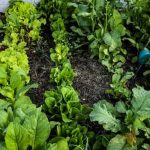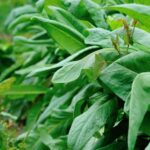What is a natural insecticide for vegetable gardens? Natural insecticides are an essential part of maintaining a healthy and thriving vegetable garden. In this article, we will explore the various types of natural insecticides, including organic options and DIY remedies, as well as the importance of using them to combat common pests in vegetable gardens. We will also discuss the benefits of using natural insecticides for vegetables and provide tips for maintaining a pest-free garden.
Using natural insecticides in your vegetable garden is crucial for keeping harmful pests at bay without introducing harmful chemicals into your food supply. By understanding the different types of natural insecticides available, you can make informed decisions about which ones are best suited to your specific gardening needs. Additionally, learning how to make and use natural insecticides at home empowers you to take control of your garden’s health in an eco-friendly way.
Common pests such as aphids, spider mites, and caterpillars can wreak havoc on vegetable gardens if left unchecked. These pests can damage plants, reduce yields, and even introduce diseases. By using natural insecticides, you can effectively manage these pests while minimizing their impact on your precious crops. Stay tuned as we delve deeper into the world of natural insecticides and explore the best practices for applying them in your own vegetable garden.
The Importance of Using Natural Insecticides
Environmental Impact
Using natural insecticides in vegetable gardens is important for the environment. Traditional chemical insecticides can have harmful effects on the ecosystem, including killing not only pests but also beneficial insects such as bees and butterflies. These chemicals can also leach into the soil and water, causing damage to surrounding plants and wildlife. By opting for natural insecticides, gardeners can minimize their impact on the environment and promote a healthier ecosystem.
Health Benefits
Another significant reason for using natural insecticides in vegetable gardens is the potential health benefits. Many chemical insecticides contain toxins that can be harmful if ingested or inhaled. When these chemicals are used on edible crops, there is a risk of residue remaining on the vegetables, which can be harmful to human health when consumed. Natural insecticides are often made from ingredients that are safe for consumption, providing peace of mind for those growing their own produce.
Sustainable Agriculture
The use of natural insecticides aligns with the principles of sustainable agriculture. By utilizing organic and naturally-derived methods to manage pests in vegetable gardens, farmers and gardeners contribute to a more sustainable and environmentally friendly approach to food production. This promotes biodiversity, reduces pollution, and supports healthier ecosystems. As awareness of the importance of sustainable agriculture grows, so does the interest in natural insecticides as an eco-friendly alternative to traditional chemical pesticides.
Common Pests in Vegetable Gardens and Their Impact
One of the biggest challenges that vegetable gardeners face is dealing with pests that can cause significant damage to their plants. These pests can include insects such as aphids, caterpillars, and beetles, as well as small animals like rabbits and deer. Understanding the impact of these pests is crucial in finding effective natural insecticides for vegetable gardens.
Here are some common pests found in vegetable gardens:
- Aphids: These small insects feed on the sap of plants, causing them to wilt and die.
- Caterpillars: They can munch through leaves and stems, leading to defoliation and stunted growth.
- Beetles: Some beetles, such as the Colorado potato beetle, can completely strip a plant of its foliage.
- Rabbits and Deer: These animals can feed on a variety of vegetables, causing extensive damage to crops.
The impact of these pests goes beyond just physical damage to the plants. Infestations can also lead to decreased yield, poor quality produce, and increased susceptibility to diseases. As a result, many vegetable gardeners are seeking natural insecticides as a way to manage these pests effectively without harming the environment or human health.
By understanding the types of pests that commonly affect vegetable gardens, gardeners can better identify which natural insecticide will be most effective for their particular situation. Whether it’s using organic options available in stores or creating DIY remedies at home, finding the right natural solution is essential for maintaining a healthy and thriving vegetable garden.
Different Types of Natural Insecticides (Organic Options, DIY Remedies, Etc)
When it comes to keeping pests at bay in your vegetable garden, natural insecticides are a popular choice for many gardeners. There are various types of natural insecticides available, including organic options and do-it-yourself remedies that can be effective in controlling pests without harmful chemicals.
Organic options such as neem oil, pyrethrin, and diatomaceous earth are derived from natural sources and are safe for use in vegetable gardens. These products work by targeting specific pests while leaving beneficial insects unharmed. Additionally, organic insecticides are environmentally friendly and easily biodegradable, making them an ideal choice for sustainable gardening practices.
For those who prefer a DIY approach, there are numerous home remedies that can effectively control pests in vegetable gardens. Ingredients such as garlic, hot peppers, and essential oils have been used for centuries to create homemade insecticides. These natural solutions offer an affordable and chemical-free alternative for managing pest populations in the garden.
Overall, understanding the different types of natural insecticides is essential for maintaining a healthy and productive vegetable garden. With the wide range of options available, gardeners can choose the best natural insecticide for their specific needs while minimizing the impact on the environment. By incorporating these alternatives into their gardening practices, individuals can enjoy bountiful harvests without compromising the health of their plants or the planet.
How to Make and Use Natural Insecticides at Home
Homemade Organic Insecticides
One of the most cost-effective and natural ways to control pests in your vegetable garden is by making your own organic insecticides. Ingredients such as garlic, hot peppers, neem oil, and essential oils like peppermint and lavender can be used to create effective insecticide sprays. These homemade solutions are not only safe for the environment but also for the beneficial insects that help pollinate your vegetables.
Application Methods
When using natural insecticides in your vegetable garden, it’s important to follow proper application methods to ensure their effectiveness. Spraying the underside of leaves where pests tend to hide, and applying the solution during the cooler parts of the day can help maximize its impact. It’s also crucial to reapply the insecticide after heavy rain or as needed based on pest activity.
Caution and Safety
While natural insecticides are generally safer than chemical alternatives, it’s still important to handle them with caution. Some ingredients may cause skin irritation or allergic reactions, so wearing gloves and protective clothing when mixing and applying these solutions is recommended. Additionally, always label homemade insecticides properly and store them out of reach from children and pets.
By making and using natural insecticides at home, you can maintain a healthy and thriving vegetable garden while minimizing harm to the environment. Not only are these options effective against pests, but they also promote sustainable gardening practices that benefit both your crops and local ecosystems.
Best Practices for Applying Natural Insecticides in Vegetable Gardens
Applying natural insecticides in your vegetable garden is an important step in keeping pests at bay and ensuring the health and productivity of your crops. However, it’s crucial to follow best practices to maximize the effectiveness of these insecticides while minimizing any potential harm to the environment and beneficial insects.
First and foremost, it’s essential to properly identify the pests that are affecting your vegetable garden. Different insects may require different approaches, so knowing exactly what you’re dealing with will help you select the most appropriate natural insecticide. Additionally, understanding the life cycle and behavior of the pests can also guide you in timing your application for maximum impact.
When applying natural insecticides, it’s important to follow the instructions on the product label or recipe carefully. Whether you’re using a commercial organic product or making a DIY remedy at home, measuring the right amount and applying it correctly will ensure that it effectively targets pests without harming your vegetables or other organisms in the garden.
It’s also advisable to apply natural insecticides during the early morning or late afternoon when beneficial insects are less active. This can help minimize any unintended impact on these helpful creatures while still effectively controlling pest populations. Finally, regular monitoring of your vegetable garden is crucial to assess the effectiveness of the insecticide and make any necessary adjustments to your pest management plan.
| Best Practices | Applying Natural Insecticides |
|---|---|
| Identify Pests | Properly identify pests before choosing a natural insecticide |
| Follow Instructions | Adhere to product label or recipe instructions for correct application |
| Timing | Apply insecticides during early morning or late afternoon to minimize impact on beneficial insects |
Benefits of Using Natural Insecticides for Vegetables
Natural insecticides are becoming increasingly popular among vegetable gardeners due to their numerous benefits. These natural alternatives to chemical pesticides offer a safer and more environmentally friendly way to control pests and protect vegetable crops. One of the key benefits of using natural insecticides in vegetable gardens is the reduction of harmful chemicals that can pose health risks to humans, pets, and beneficial insects.
Furthermore, natural insecticides help promote biodiversity in the garden by preserving important pollinators such as bees, butterflies, and other beneficial insects. By avoiding toxic chemicals, natural insecticides also contribute to creating a healthier ecosystem in and around the vegetable garden. This approach supports sustainable gardening practices and reduces the negative impact on the environment.
In addition to being safer for human health and the environment, natural insecticides are often more cost-effective than their chemical counterparts. Many organic options can be made at home using simple ingredients, making them an affordable solution for pest management in vegetable gardens. Furthermore, when used correctly, these natural insecticides can effectively control pests while minimizing harm to non-target organisms.
| Benefit | Description |
|---|---|
| Safer Pest Control | Natural insecticides reduce exposure to harmful chemicals for humans and animals. |
| Promotes Biodiversity | Preserves important pollinators and supports a healthier garden ecosystem. |
| Cost-Effective SolutionMany natural insecticides can be made at home using affordable ingredients. |
Tips for Maintaining a Pest-Free Vegetable Garden
One of the most effective ways to maintain a pest-free vegetable garden is to practice good garden hygiene. This includes keeping the garden free of debris and weeds, which can harbor pests and provide them with hiding places. Regularly check your plants for signs of infestation, such as holes in leaves or discoloration, and take action promptly to prevent the problem from spreading.
Another important tip for maintaining a pest-free vegetable garden is to encourage natural predators that feed on garden pests. This can be done by planting insectary plants that attract beneficial insects, such as ladybugs and lacewings, which are known to feed on aphids and other common garden pests. Additionally, providing habitat for birds and other wildlife can help keep pest populations in check.
In addition to practicing good gardening hygiene and encouraging natural predators, utilizing natural insecticides can be an effective method for maintaining a pest-free vegetable garden. When used correctly, natural insecticides can target specific pests while minimizing harm to beneficial insects and the environment. By choosing natural insecticides over chemical ones, you can protect your vegetable garden from harmful pests while promoting a healthy ecosystem.
Overall, by implementing these tips for maintaining a pest-free vegetable garden, you can ensure the health and productivity of your crops without resorting to harmful chemicals. By integrating natural insecticides into your gardening routine and supporting beneficial wildlife, you can create a balanced ecosystem that will help your vegetables thrive.
Conclusion
In conclusion, the use of natural insecticides in vegetable gardens is a sustainable and environmentally friendly practice that offers numerous benefits. By opting for natural insecticides, gardeners can effectively manage pests while minimizing harm to beneficial organisms, such as pollinators and soil microbes. This approach also reduces the risk of chemical residues in edible crops, making them safer for consumption.
As more people become aware of the potential health and environmental risks associated with synthetic pesticides, the future of natural insecticides for sustainable vegetable gardening looks promising. There is a growing interest in organic options and do-it-yourself remedies that are safe, affordable, and easy to make at home. Additionally, ongoing research and innovation in this field continue to expand the range of effective natural insecticides available to gardeners.
For those looking to maintain a pest-free vegetable garden without relying on harmful chemicals, it’s important to explore the different types of natural insecticides and learn how to make and use them properly. By incorporating best practices for applying these solutions and implementing integrated pest management strategies, gardeners can enjoy healthy harvests while supporting a more balanced ecosystem in their own backyard.
Ultimately, embracing natural insecticides is an essential step toward promoting sustainable agriculture and preserving our environment for future generations.
Frequently Asked Questions
What Can I Spray on My Vegetables to Keep Bugs From Eating Them?
One effective solution to keep bugs from eating your vegetables is to spray them with a mixture of water and dish soap. This soapy water can suffocate insects and deter them from feeding on your plants.
What Is a Natural Insect Killer for Vegetable Plants?
Neem oil is a natural insect killer that can be used on vegetable plants. It is derived from the seeds of the neem tree and works by disrupting the feeding, mating, and molting processes of insects, ultimately causing their demise.
How Do You Keep Bugs Off Vegetable Plants Organically?
To keep bugs off vegetable plants organically, you can introduce beneficial insects like ladybugs or lacewings to your garden. These predatory insects feed on pests like aphids and caterpillars, helping to naturally control the bug population in your garden. Additionally, planting companion plants such as marigolds or basil can also help repel unwanted bugs from your vegetable plants.

If you’re looking to get into vegetable gardening, or are just looking for some tips on how to make your current garden better, then you’ve come to the right place! My name is Ethel and I have been gardening for years. In this blog, I’m going to share with you some of my best tips on how to create a successful vegetable garden.





